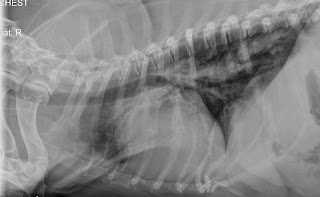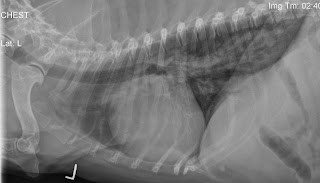It is absolutely amazing, the difference in the hospital on a Friday evening in comparison to any other day. While most things move at the speed of molasses in the winter, on Friday, suddenly, it's as if a new life is infused. Let a back dog come in at 4 and it's guaranteed that the imaging, including CT scan, will be done by 5 and the dog will be well on its way to surgery. Any other time, the molasses would slowly move and it would take hours to be done.
The other amazing thing about Friday is how quickly everyone hits the door. Better not count on someone being there at all late 'cause it ain't happening. By 5:00:01 they are gone. WHOOSH!! The gust from their leaving could knock you down and you'd better get out of the way.
And, in the vetmed world, Friday is often "dump day." All the nearby rDVM's decide that they should unload the challenging cases in their hospital that they don't want to deal with over the weekend. I've never quite understood this since most of the time further work-up won't be possible until Monday anyway, even in the referral hospital. It's even worse when the dumping "rDVM" is the in university hospital community practice (CP) service. There were at least 2 cases sent home abruptly today that I doubt were really sent home for the well-being of the patient. No, I would distinctly say that it had to do with the convenience of the clinician... To explore the motives can sometimes be a frightening prospect (even your own motives at times).
Interestingly, I have only gotten one "dump case" tonight; or, to put it better, this one is what I sometimes refer to as a "prefergency." It is a not extremely critical patient that needs further diagnostics and it was "easier" to come tonight rather than wait until Monday. Guess they have the financial means to pay for the preference as well.
Yesterday, on the other hand, was an entirely different ballgame. Yesterday, though, was more of a "thrown under the bus" type of day. Sadly, not by outside sources but by people working side by side as colleagues. Not that the occurrence is abnormal in this place. It is actually quite commonplace and you feel more surprised when it fails to occur.
A snake bite case showed up at quarter til 5, the ER overnight shift starts at 5. Guess upon whom it was dumped. I think that the icing was when the CP clinician then tried to dump callbacks for their cases on us and later called to ask about the snake bite and criticize the planned treatment regimen. Out of last night was born the repeated quote (and very atypical attitude for me) of "Not my problem!" I guess there comes a point for all of us at which we are tired of lying down and saying here, why don't you wipe your poop covered shoes all over me as you walk across my prostrate form.
This particular rotation, or I guess I should just say the last few weeks, has been particularly bad. It's easy enough to deal with small problems but when they mount up to an enormous pile they become overwhelming and that is when tempers flare and patience becomes frayed. In fact, it is usually the pile of small things that make me break much faster than the big issues - those I just take in stride. And no matter what anyone says, it always seems that if a shift begins one way, it just can't seem to be turned around and made better!
So much for Fridays...When you hear the ka-thump, just look for the big yellow bus that ran me over then backed up for a second chance.
3 years ago




